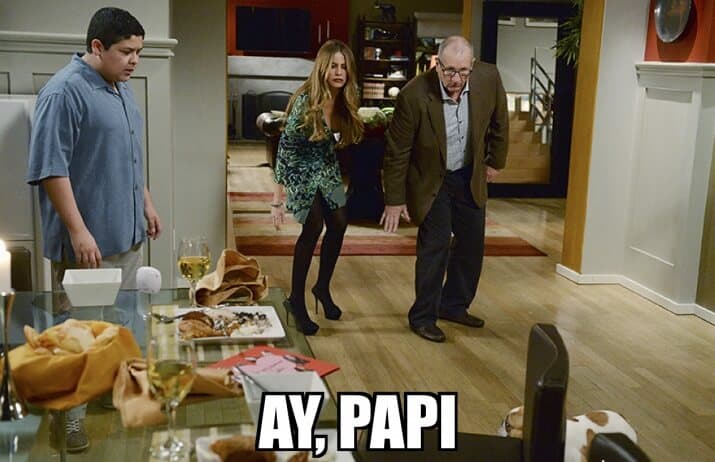If you’re learning Spanish, you may want to learn some new and cute words that you can use to call your daughter. For that reason, we’ve compiled 11 popular Spanish nicknames that you can use to name or call your daughter by.
The words on this list are quite common in Spanish (I myself have been called with some of these nicknames before ;)). You’ll notice that some of these nicknames are only common in a few Spanish speaking countries while others are considered more common in all countries. Read the descriptions carefully so you can choose the best nickname for your daughter.
1. Mija / Mijita – Daughter / My daughter
In Latin American countries, mija is a very popular word that parents use to call their daughters. ‘Mija’ is the shortened version of mi hija (‘my daughter’), as a result, it could be translated either as my daughter or simply daughter.
Even though calling your girl ‘my daughter’ could sound too outdated in English, ‘mija’ is a very affectionate and lovable word in Spanish. Unlike other nicknames, ‘mija’ can be applied to daughters of all ages.
Mija, te dejé tu bolsa en la mesa
Daughter, I left your bag on the table
¿Cómo estás, mija? ¿Cómo estuvo tu día?
How are you, my daughter? How was your day?
Ten cuidado, mija, llámame cuando llegues
Be careful, daughter, call me when you get there
Mijita is the diminutive form of ‘mija’, therefore, it could be considered slightly more affectionate than ‘mija’. ‘Mijita’ literally means ‘my little daughter’, but it could be translated like ‘daughter’ or ‘baby’.
Ya vete a dormir, mijita, te ves muy cansada
Go to sleep, daughter, you look very tired
Take Note: ‘Mija’ is such a popular word in Latin American countries that grown-up people use it to talk to a younger woman. In this context, ‘mija’ is not necessarily implying a family bond, but rather when there’s a significant age gap.
2.Nena – Baby / Baby Girl
Nena is a popular and cutesy Spanish word that people use either to call or refer to their daughters. This word is commonly used in all Spanish speaking countries and it’s the direct translation of ‘baby’ or ‘baby girl’. If you want to be even more affectionate, you could use its diminutive form ‘nenita’.
¡Nenita! ¿Qué quieres comer?
What do you want to eat, baby?
¡Qué nena tan hermosa tienes!
You have such a beautiful baby girl!
Leo y yo tenemos dos hermosas nenas
Leo and I have two beautiful baby girls
Nena, necesito que le lleves esto a tu abuelita
Baby, I need you to take this to your granny
Take Note: In general, ‘nena’ is more commonly used for younger daughters. However, there are some parents that don’t mind using this word with their grown-up girls. Additionally, ‘nena’ is the direct translation of ‘baby’, as a result, it can also be used as a pet name for a girlfriend.
3. Mami / Mamacita – Baby Girl / Honey
In Latin American countries, mami is a very common nickname for young daughters.

If you’ve ever watched Modern Family, this is exactly the same as Gloria Pritchett calling Manny ‘papi’.
When using mami as a nickname for your daughter you need to keep in mind that this word is more commonly used with girls that haven’t reached puberty.
‘Mami’ is a word that both dads and moms can use when calling their daughter. On top of that, Latin American speakers can also use the variation ‘mamacita’ with the same purpose. Both of these words are closer in meaning to ‘baby girl’ or ‘honey’.
¡No corras, mami! Te vas a caer
Don’t run, honey! You’re going to fall
¿Qué pasó, mamacita? ¿Por qué lloras?
What happened, baby girl? Why are you crying?
Recoge tus juguetes, mami, ya vamos a comer
Pick up your toys, baby girl, we’re going to eat now
Take Note: In informal Spanish, ‘mami’ and ‘mamacita’ can be used in a completely different context as a way to call a young woman ‘hot’. Additionally, these words can also be used as nicknames for moms.
Related Resource: Different Ways to Say Mom in Spanish
4. Gorda – Fatty / Chubby
Although in other languages may sound mocking or even a little bit insulting, in Spanish, ‘gorda’ is a very popular nickname for a daughter. For Spanish speakers, calling a girl ‘gorda’ doesn’t necessarily mean that you’re describing her body, it’s rather a cute and lovable pet name (hard to believe, but true).
Spanish speakers can also use ‘gordita’ as a pet name for their daughters. Both of these nicknames literally mean ‘fatty’ or ‘chubby’.
¡Gorda! Te buscan en la puerta
Fatty! Somebody is at the door for you
¿Y la gordita? ¿Está en su cuarto?
And the fatty? Is she in her room?
¡Despierta, gordita! Se te va a hacer tarde para la escuela
Wake up, chubby! You’re going to be late for school
Take Note: ‘Gorda’ and ‘gordita’ are popular nicknames for girls and daughters in Spanish and they don’t mean to be rude at all. In fact, my grandparents have called my aunt ‘gorda’ her whole life as a nickname and she’s not only fit but also loves her the pet name ;).
5. Linda – Cutie / Sweetie
Linda is a very affectionate Spanish nickname that you can use both with younger and older daughters. In this context, ‘linda’ would be translated either as ‘cutie’ or ‘sweetie’.
Ya me voy, linda, nos vemos más tarde
I’m leaving, sweetie, see you later
Oye, linda, ¿sabes dónde dejé mis llaves?
Hey, cutie, do you know where I left my keys?
¡Córrele, linda! ¡Ya está lloviendo y no me quiero mojar!
Hurry up, sweetie! It’s raining and I don’t want to get wet!
Plus: In Spanish, you can also combine ‘linda’ with all the nicknames from this list. That way you will have a super cute and affectionate nickname for your daughter. Notice that in this situation, ‘linda’ could be translated as ‘cute’, ‘pretty’ or ‘beautiful’. Here are some examples:
¡Feliz cumpleaños, nenita linda!
Happy birthday, cute baby girl!
¿Cómo te sientes mi muñequita linda?
How are you feeling my beautiful baby doll?
Take Note: Combining ‘linda’ with other nicknames is a nice way to show your daughter your love because not only are you showing your affection with the pet name, but you’re also using ‘linda’ to call her beautiful.
Related Resource: How to Call a Girl Beautiful in Spanish
6. Muñequita – Baby doll

Muñequita or muñeca is another common word that people use to call their daughters. On top of being known in all Spanish speaking countries, you can use it with both young and grown-up daughters. Although it isn’t a rule of thumb, this word tends to be more common among moms and dads using it more with baby daughters. ‘Muñequita’ or ‘muñeca’ can be translated as ‘baby doll’ or ‘doll’.
Muñeca, ¿dónde dejaste mis llaves?
Doll, where did you leave my keys?
Hola, muñequita, ¿cómo te fue en la escuela?
Hi, baby doll, how was school?
¿Están tocando? Muñequita, ¿puedes abrir la puerta?
Is somebody knocking? Baby doll, can you open the door?
Take Note: Just like other nicknames for daughters, ‘muñeca’ can be used in other contexts as a pet name for a girlfriend or as an informal way to call a woman attractive.
7. Princesa – Princess
In Spanish, people use princesa either as a nickname or as a way to refer to their or someone else’s daughters. ‘Princesa’ is the direct translation of ‘princess’ and it can be used with both young and older daughters (if they’re not too embarrassed by it). For some speakers, this word is a little bit too cutesy, so keep that in mind before using it.
¡Qué grande y qué bonita está tu princesa!
How big and pretty your princess is!
Princesa, háblale a tus hermanos, ya nos vamos
Princessa, call your brothers, we’re leaving
¿Quieres algo más de comer, princesa, o estás bien?
Do you want something else to eat, princess? Or are you okay?
8. Chaparra / Chaparrita – Shorty
Although chaparra or chaparrita is a Spanish adjective that can be used to describe a person’s height, people also use it as an affectionate word to call their daughters. Both of these words are translated as ‘shorty’ and they’re not considered offensive or insulting.
Since teenagers may be embarrassed by the nicknames their parents use, ‘chaparra’ or ‘chaparrita’ is very popular for young daughters. However, if your daughter is okay with it, you can use it with girls of all ages.
¿Qué tal estuvo tu día, chaparra?
How was your day, shorty?
Toma, chaparrita, dejaste tu mochila en el coche
Here, shorty, you left your backpack in the car
Chaparrita, apaga la luz, ya es tarde y mañana tienes escuela
Shorty, turn the light off, it’s late and you have school tomorrow
Take Note: In Spanish, many nicknames for daughters come from some of the girl’s physical traits. For instance, flaca (skinny), güera (blond/blondie) or chaparrita (short/shorty). Notice that this rule is not necessarily applicable to ‘gordita’.
9. Morra / Morrita – Kiddo / Little girl
In Mexico, morra or morrita is a slang word that means ‘girl’, ‘kiddo’, or ‘little girl’. The most common context to use this term is to refer or to talk about your daughter. However, some parents also use it as an informal and playful nickname too. Unlike other words from this list, as a nickname, ‘morra’ and ‘morrita’ is more commonly used with teenagers or older daughters.
‘Morra’ or ‘morrita’ is widely popular among men. However, women may also use it in private.
Mi morrita está estudiando medicina
My little girl is studying medicine
¿Qué están haciendo, morritas? ¿Por qué gritan tanto?
What are you doing, kiddos? Why are you screaming so much?
Prepara tus cosas, morra, nos vamos en cinco minutos
Prepare your things, girl, we’re leaving in five minutes
Take Note: ‘Morra’ is a very informal word, as a result, moms may be reluctant to use it with their daughters (my mom doesn’t care about my feelings, so she loves to call me ‘morra’ :/). Since it’s a slang term, make sure to use a lovable and cute tone of voice when using this word as a pet name.
Related Resource: Morro & Morra in Mexican Slang
10. Chiquita – Kiddo / Baby girl
Chiquita is an Spanish adjective that usually refers to a person’s or an object’s size. However, Spanish speakers also use it as a nickname for their daughters. In this context, ‘chiquita’ would be translated either as ‘kiddo’ or ‘baby girl’.
As many of the nicknames presented on this list, ‘chiquita’ is a perfect pet name for daughters of all ages; therefore, using it depends more on whether your daughter feels comfortable with it.
Feliz cumpleaños, mi chiquita, te amo mucho
Happy birthday, baby girl, I love you very much
Hola, mi chiquita linda, ¿cómo te fue?
Hey, my cute baby girl, how was your day’
Chiquita, tu mamá te dejó algunas cosas en la mesa
Your mom left you a few things on the table, kiddo
11. Mi niña – My girl / Baby girl
Mi niña is another common nickname that Spanish speaking parents may use to talk to their daughters. Depending on the context, ‘mi niña’ can either be translated either as ‘my girl’ or ‘baby girl’.
¿Cómo está mi niña hermosa?
How is my beautiful girl?
¿Puedes llevar estos libros a la sala, mi niña?
Can you take these books to the living room, baby girl?
Mi niña, tu mamá y yo vamos ir al súper, ¿necesitas algo?
Your mom and I are going to the supermarket, baby girl, do you need anything?
Take Note: ‘Mi niña’ is such a lovable word that it can also be used by other grown-ups when talking to a younger woman. In fact, many female teachers use this word with their girl students as a way to show them affection.
Wrapping Up
In this list, we looked at some of the most common words and nicknames that you can use to call your daughter in Spanish. Before using these terms, make sure to read the descriptions so you choose the best match for your daughter.
If you rather play it safe (as many Spanish speaking parents), you can use your daughter’s name to form a nickname. Here is a list with some popular names and nicknames in Spanish. Hopefully, you’ll find your daughter’s name here (or an equivalent), so you can start using your knowledge of Spanish to call her by an alternative, endearing nickname. Good luck! 😉



